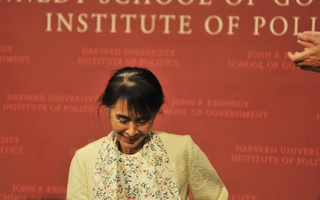{shortcode-300b6279975dcacb76e7a44687b0fd7dcc4f772c}Assistant Physics professor Cora Dvorkin was named the 2018 Harvard Scientist of the Year by the Harvard Foundation for Intercultural and Race Relations last month.
Each year, student interns at the Harvard Foundation nominate a scientist they believe deserves recognition for his or her extraordinary work in science, engineering, and mathematics. Previous recipients of the Harvard Scientist of the Year award include Nobel laureate Takaaki Kajita and Astronomy professor Alyssa A. Goodman.
“I was very pleasantly surprised,” Dvorkin said of receiving the award. “It was exciting to see that I’m recognized not only by my colleagues but also by the students of Harvard, which really are the ones who make Harvard.”
Dvorkin, a former fellow of the Institute for Theory and Computation at the Harvard-Smithsonian Center for Astrophysics, is a theoretical cosmologist who studies the origins and composition of the early universe. Her research group draws on data gathered by satellites and telescopes located all over the world to characterize and measure the cosmic microwave background, which she defines as “the afterglow coming from the Big Bang.”
In a scientific article published earlier this year, Dvorkin and two postdoctoral fellows from her research group examined the statistics of galaxy distributions in order to observe the signatures of massive spinning particles—particles that may have been present right after the Big Bang. Her research group also seeks to understand more about the particle nature of dark matter.
In addition to pursuing research, Dvorkin also teaches Physics 15c: “Wave Phenomena,” an undergraduate-level course offered in the spring, and Physics 212: “Cosmology,” a graduate-level course offered in the fall. Dvorkin created the latter class in 2016.
“This is a new course that didn’t exist before in the Physics Department, and it has been pretty successful,” Dvorkin said, referring to Physics 212. “Students seem to like it a lot.”
The nomination praised Dvorkin for her “significant contributions to the field of physics and cosmology” and for her “engagement with students on Harvard College’s campus.”
Dvorkin accepted the Scientist of the Year award at a ceremony and luncheon held Friday and at the "Albert Einstein Science Conference: Advancing Women and Minorities in Science, Engineering, and Mathematics" held Saturday. The Albert Einstein Science Conference is an annual conference hosted by the Harvard Foundation that aims to get children interested in science.
“These young students come from public schools around the area, and they have different ethnic and socioeconomic backgrounds,” Dvorkin said. “I think it’s important to target students—girls and boys at the very young ages, especially the ones who perhaps have difficulties accessing a science course, or perhaps they don’t have a role model who looks like them.”
Several student interns at the Harvard Foundation did not respond to requests for comment on Dvorkin’s nomination and receipt of the organization’s annual award.
—Staff writer Amy L. Jia can be reached at amy.jia@thecrimson.com. Follow her on Twitter @AmyLJia.
—Staff writer Sanjana L. Narayanan can be reached at sanjana.narayanan@thecrimson.com.
Read more in News
The Diversity Task Force Report, AnalyzedRecommended Articles
-
Geochemistry Professor Awarded 'Genius Grant' for Climate ResearchFew people can explain why Boston has 70-degree weather in December and snow in April. But with his recent award
-
Alumni Attend DiscussionsFour scientists at the University told a Reunion crowd yesterday about the problems of their work and their hopes for
-
FACT AND RUMOR.The Yale freshman are said to have a very strong crew. The juniors received their new shell from Waters on
-
 Muslim Students Criticize Selection of Myanmar Leader for Humanitarian Award
Muslim Students Criticize Selection of Myanmar Leader for Humanitarian Award -
Elton John Named Harvard Humanitarian of the YearEnglish singer, composer, and activist Elton H. John will receive the 2017 Harvard University Humanitarian of the Year award.













